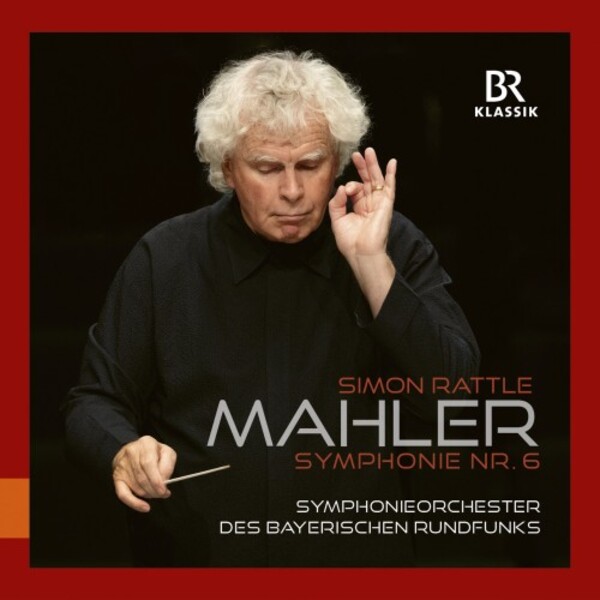MAHLER Symphony No 6 (Rattle)
View record and artist detailsRecord and Artist Details
Genre:
Orchestral
Label: BR Klassik
Magazine Review Date: 04/2024
Media Format: CD or Download
Media Runtime: 82
Mastering:
DDD
Catalogue Number: 900217

Tracks:
| Composition | Artist Credit |
|---|---|
| Symphony No. 6 |
Gustav Mahler, Composer
Bavarian Radio Symphony Orchestra Simon Rattle, Conductor |
Author: Edward Seckerson
The autumn of Simon Rattle’s illustrious career continues to deliver in abundance. This deeply impressive account of Mahler’s harrowing Sixth Symphony is plainly the product of journeying with it over many decades (what a long way we have come since that auspicious CBSO cycle), of choices made and re-evaluated, of emotions deepened with greater understanding of the text, of much soul-searching between and beyond the notes. It feels lived-in, inhabited, and like the recent Ninth (12/22) blessed by playing from an orchestra which not only shares his vision but brings it off the page with extraordinary artistry. There is only one aspect of it that has me agreeing to disagree and regular readers can probably guess at what that might be: Rattle’s commitment to the revised order for the middle movements.
But let’s not dwell on that for now. There is too much to admire and thrill to and most of all a sense of evolution about it which carries the listener from the remorseless opening pages through glimmering hope to abject despair. Rattle’s tempo for that opening steers a compelling path between a driving trenchancy and world-weary weightiness. You really don’t need to underline its grimness with a Barbirolli-like deliberation – there needs to be an imperative, an unstoppable momentum about it.
The vaulting second subject – the so-called ‘Alma’ theme – has the requisite touch of ecstasy, a lightening of mood and countenance. And I love the way Rattle allows himself a little more expansive rubato in the repeat with descanting horns gloriously heartfelt. He makes a great deal, too, of the transformations of this theme, drawing our ears subliminally to them in the rapt middle section of the movement – the magical departure to higher planes, literally and metaphorically (gorgeous oboe and violin solos lending sweet solace) – and the defiant approach to the momentous coda. The mighty dissonance which emerges from what is in effect an outsized appoggiatura just prior to the final sprint is crushing.
So here we are at an apparent turning point in the piece and all my instincts are crying out for the shocking descent back into the minor key and relentless marching but now grotesquely distorted into an ugly limping goose-step. But that, of course, is not what Rattle gives us in his allegiance to the revised movement order and so we depart into remote E flat major and a yearning that knows no bounds in the aching Andante.
Suffice it to say that Rattle’s Bavarians bring extraordinary poetry to the melancholic Andante with those famed Rattle pianissimos sometimes so hushed as to be almost out of reach. Like that whisper of a violin glissando and plangent oboe solo preceding the climax. There is hope here but it is fragile.
Rattle’s characterisation of the grisly Scherzo feels frighteningly authentic now. Its desperate attempts to turn a halting Ländler into something halfway pleasing grow increasingly grim and spectral – truly an ungainly dance of death – with the rattle of xylophone and sneering stopped horns seeming to welcome the encroaching darkness.
And yes, you could argue that Mahler is prefacing here the nightmare scenario of the finale. Rattle chronicles its highs and lows, its succession of terrifying apparitions, with an unerring sense of its cumulative desperation. Again fantastic rhythmic drive and a no-holds-barred approach to those hammer blows of doom (perfect in effect as you might expect from an erstwhile percussionist) and the trumpet- and trombone-laden fury which weighs down on us in their wake. And as Rattle repeatedly reminds us, the other-worldly, even cosmic effect of the opening and those other brief moments of repose with their strange glimmers of harps and celesta and tubular bells point us irresistibly to the Second Viennese School and beyond.
In a recent comparison on BBC Radio 3 I chose the live 1983 Tennstedt/LPO Proms performance for its uncompromising and unremitting intensity. Neurotic and then some. There is Bernstein and the Vienna Philharmonic, too – also unforgettable. Both incidentally preserve the original ordering of the middle movements. But as that threnody of trombones confirms that not a scintilla of hope remains, Rattle and this marvellous orchestra must join this triumvirate at the top of the recommendations.
Explore the world’s largest classical music catalogue on Apple Music Classical.
Included with an Apple Music subscription. Download now.

Gramophone Digital Club
- Digital Edition
- Digital Archive
- Reviews Database
- Events & Offers
From £9.20 / month
Subscribe
Gramophone Club
- Print Edition
- Digital Edition
- Digital Archive
- Reviews Database
- Events & Offers
From £11.45 / month
Subscribe
If you are a library, university or other organisation that would be interested in an institutional subscription to Gramophone please click here for further information.






